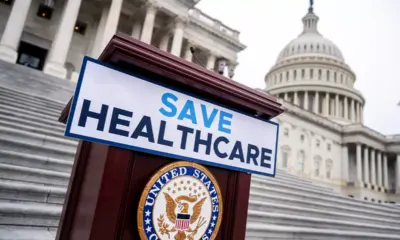Education
Ghislaine Maxwell Appeals to Supreme Court to Overturn Conviction

Ghislaine Maxwell, the former associate of Jeffrey Epstein, has filed an appeal with the United States Supreme Court to overturn her conviction for sex trafficking. This appeal, submitted on Monday, centers on claims that a non-prosecution agreement Epstein reached with federal authorities should extend to her, providing immunity from prosecution. Maxwell’s attorneys argue that the essence of the case hinges on governmental promises rather than Epstein’s actions.
Maxwell was sentenced to 20 years in federal prison in 2022 for her role in a scheme that involved grooming and sexually abusing underage girls alongside Epstein. In conjunction with her appeal, which was initially filed in April, she has recently engaged with Deputy Attorney General Todd Blanche for questioning, although those discussions were not referenced in the Supreme Court filing.
In a statement, Maxwell’s attorney, David Oscar Markus, emphasized the significance of the agreement, citing former President Donald Trump’s approach to deal-making. He stated, “President Trump built his legacy in part on the power of a deal – and surely he would agree that when the United States gives its word, it must stand by it.” Markus framed the appeal not only as a legal battle but as a call for justice, suggesting it is unjust to hold Maxwell accountable for Epstein’s crimes, especially given the government’s alleged assurance of her non-prosecution.
Maxwell’s appeal is rooted in the assertion that she should benefit from the non-prosecution agreement Epstein secured during his plea deal. However, the 2nd US Circuit Court of Appeals in New York ruled against her, determining that the agreement with Florida prosecutors did not apply to authorities in New York. This decision highlights the differing interpretations of non-prosecution agreements across various appeal courts in the United States.
The Supreme Court is expected to decide this fall whether to hear Maxwell’s case. In her arguments, she contends that the government’s position reflects a desire for a different interpretation of the agreement rather than adherence to its actual terms. “The government’s argument, across the board, is essentially an appeal to what it wishes the agreement had said, rather than what it actually says,” she stated.
Epstein, who pleaded guilty to state prostitution charges in 2008, faced federal sex trafficking charges in July 2019 but died by suicide in prison shortly thereafter. As the legal proceedings continue, the Trump administration has defended the validity of the charges against Maxwell at the Supreme Court, even as the Justice Department engages with her amid ongoing scrutiny regarding the management of Epstein-related documents.
In a brief filed with the Supreme Court on July 14, the Justice Department asserted, “Petitioner was not a party to the relevant agreement. Only Epstein and the Florida USAO were parties.” This statement reinforces the government’s stance that Maxwell does not have the protections she claims.
As this high-profile case unfolds, the implications of the Supreme Court’s potential decision could have far-reaching consequences for Maxwell and for the broader conversation surrounding accountability in cases linked to Epstein and his associates.
-

 Technology5 months ago
Technology5 months agoDiscover the Top 10 Calorie Counting Apps of 2025
-

 Health2 months ago
Health2 months agoBella Hadid Shares Health Update After Treatment for Lyme Disease
-

 Health3 months ago
Health3 months agoErin Bates Shares Recovery Update Following Sepsis Complications
-

 Technology4 months ago
Technology4 months agoDiscover How to Reverse Image Search Using ChatGPT Effortlessly
-

 Technology1 month ago
Technology1 month agoDiscover 2025’s Top GPUs for Exceptional 4K Gaming Performance
-

 Technology2 months ago
Technology2 months agoElectric Moto Influencer Surronster Arrested in Tijuana
-

 Technology5 months ago
Technology5 months agoMeta Initiates $60B AI Data Center Expansion, Starting in Ohio
-

 Technology5 months ago
Technology5 months agoRecovering a Suspended TikTok Account: A Step-by-Step Guide
-

 Health4 months ago
Health4 months agoTested: Rab Firewall Mountain Jacket Survives Harsh Conditions
-

 Lifestyle5 months ago
Lifestyle5 months agoBelton Family Reunites After Daughter Survives Hill Country Floods
-

 Technology4 months ago
Technology4 months agoHarmonic Launches AI Chatbot App to Transform Mathematical Reasoning
-

 Technology3 months ago
Technology3 months agoUncovering the Top Five Most Challenging Motorcycles to Ride





















